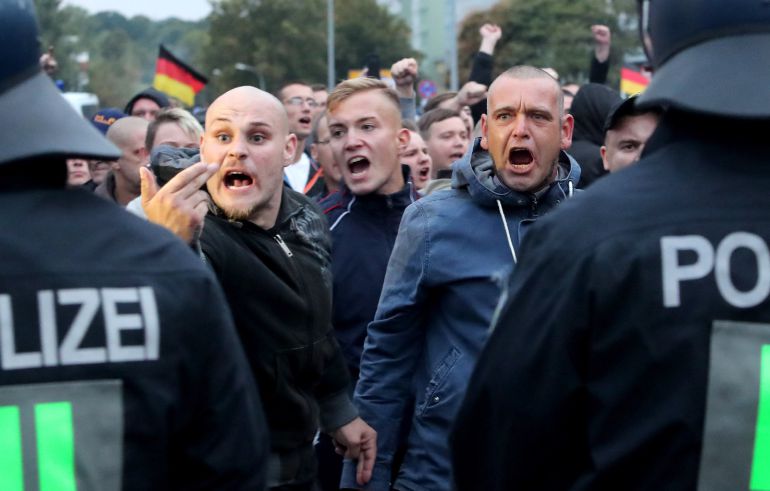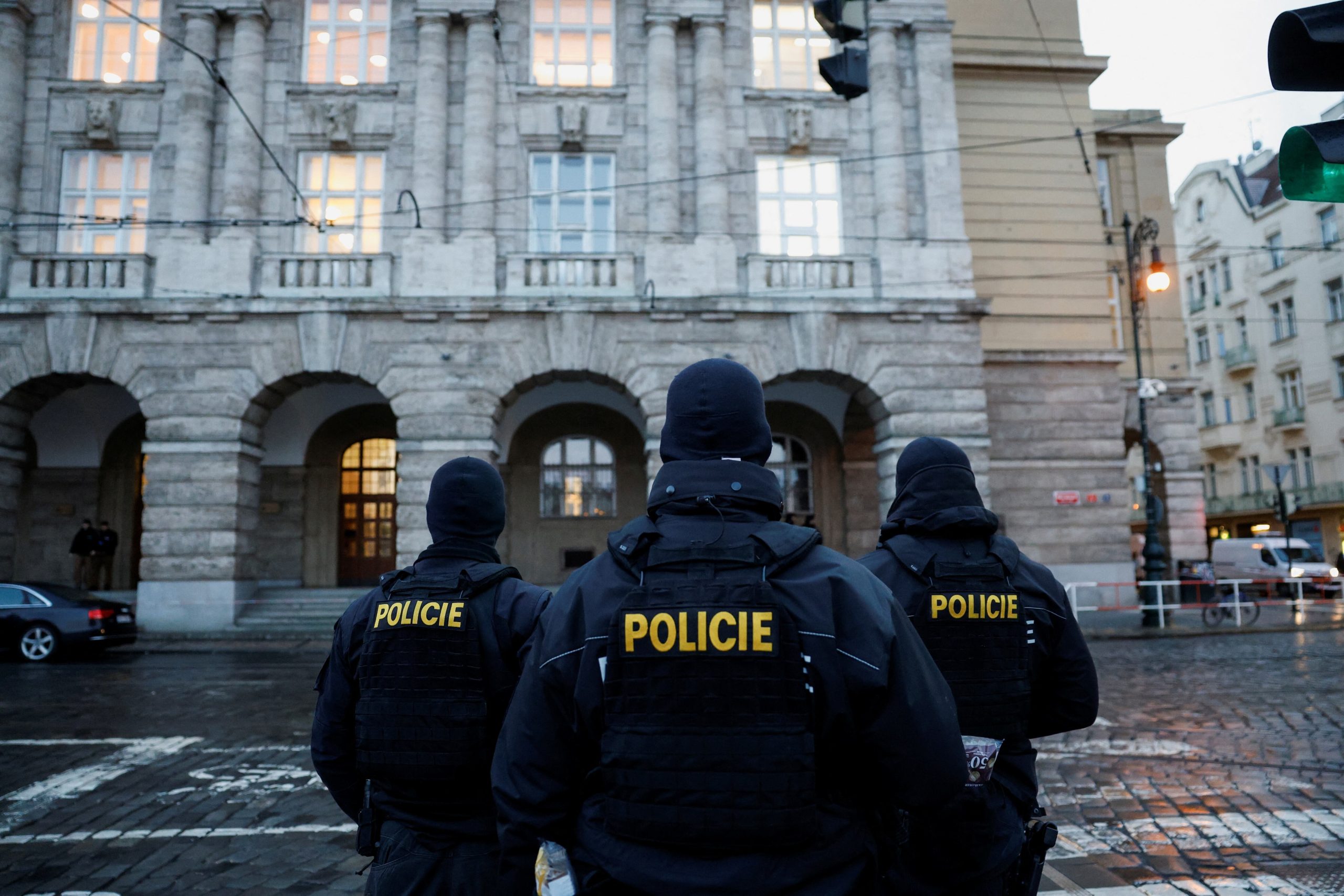The growth of far-right wings and their dangers in Germany
European Centre for Counterterrorism and Intelligence Studies – Germany & Netherlands
Germany faces many challenges in countering extremism of all sorts, most notably is the far-right ideas and its ability to mobilize. Observers warn from the growing power of populist currents, especially amid economic crises and terrorist acts. The concerns of the far-right infiltration of the German military have increased. A recent German study showed, according to DW on April 25, 2019, that the rate of German citizens who embrace the right-wing thought stands at 2.5% since two years. The study, which involved the period from September 2018 to February 2019, showed that the spread of the far-right is not a new phenomenon to Germany.
On April 29, 2019, Asharq Al Awsat reported that the German Domestic Intelligence discovered a document related to the intentions of the far-right organizations in the country, which confirms that the danger of the far-right is rising dramatically. In addition, some members of those groups have become now main players who tend to use violence and eliminate the others. If this faction was able to gain majority in the European Parliament, Europe would be on the brink of the abyss. And this threatens that a social and humanitarian movement different from what Europe has known throughout the ages of Enlightenment would prevail. According to Al Jazeera on May 4, 2019, Germany announced that the Ministry of Interior counted 24,000 far-right extremists, 12,700 are potentially violent. Neue Osnabrücker Zeitung said that these statistics were conducted in 2017.
List of Extremist and Nazi Populist Currents
Alternative for Germany
The party was founded in Berlin on February 6, 2013. It opposed the immigration policies in Germany after the refugee crisis in 2015. It calls for the dissolution of the Eurozone and returning to the national currency. It is the first nationalist, right-wing party that enters the Bundestag. The party enjoys its greatest popularity in the eastern part of Germany although the number of immigrants in that part is less than the rest of the country. It represents the political front for the far-right. Two trends clash inside the AfD; one is liberal nationalist which is declining and the other is gaining more influence with an ideology nearly denying the Holocaust and reinforcing xenophobia. An opinion poll conducted by INSA on February 19, 2018, showed that the AfD surpassed the SPD (center-left). According to RT, the AfD increased by 1% to record 16%.
National Democratic Party of Germany
The party was founded in 1964 as successor to the German Reich Party. On January 1, 2011, the nationalist German People’s Union merged with the NPD and the party name of the National Democratic Party of Germany was extended by the addition of “The People’s Union”. The Federal Office for the Protection of the Constitution classifies the NPD as a “threat to the constitutional order” because of its platform and philosophy. Anti-foreigners rallies draw more people. The NPD is accused of being anti-immigrant and racist. The party has 6000 members. All its representatives lost in the latest parliamentary elections. Among the party’s top leaders is Udo Voigt, the NPD’s member of the European Parliament in 2014.
The Populist Identitarian Movement
The movement was established in Germany according to the Federal Agency for Civic Education. The movement worked with the anti-refugee PEGIDA. Its ideology is based on strongly opposing Islam. It has connections to the Alternative for Germany and the Young Alternative for Germany. Its activity is concentrated in southwest Germany, particularly in Swabia and Baden-Württemberg. Regarding the number of its members, estimates varied from 80 to 300 members, whereas other estimates said it reached 500.
The Identitarian movement is monitored by the German Domestic Intelligence which considers it a movement based on a political concept that “opposes human rights and pluralist democracy,” according to Euronews on May 3, 2019. The intelligence warned on March 20, 2019 from an increase in the extremism of the “Identitarian” movement, and its incitement against foreigners and Muslims in particular, according to RT.
PEGIDA
It is a local phenomenon limited to the state of Saxony, but it resonates across eastern Germany. PEGIDA is not monitored by intelligence services in most German states. It gains support on social media more than parties represented in the German Parliament. Lars Geiges, an expert from the Institute for Democracy Studies, said that those who sympathize with PEGIDA are “well-educated people and academics who believe democracy is a good thing in principle and an eroded system which needs reform.”
Reich Citizens’ Movement (Reichsbürger)
The Reichsbürger doesn’t recognize the modern German State which was established after the collapse of Nazism (the Third Reich), which means the Third Empire, after WWII in 1945. The Reichsbürger accuses the Federal German State that was established in 1949 of being illegally established. They don’t recognize German institutions, or laws. The movement is currently monitored at a federal level by the Federal Office for the Protection of the Constitution.
A report by the Federal Office for the Protection of the Constitution (Domestic Intelligence) in July 2018 showed the presence of 16500 active members of Reichsbürger and Independent Citizens Movement, with a 3700 increase from the 2016 report. Most of those members (3500) live in Bavaria in the south, and the rest are distributed among Baden-Württemberg and North Rhine-Westphalia.
Neo-Nazis
It is a political racist extremist movement described as “Nazi” and called “the new fascism.” It is the source of the Nazi ideology. These groups include members of all classes and ages of the German society. They are supported by some political parties which have influence inside the German parliament. They are present in Brandenburg, Mecklenburg-Vorpommern, Hessen, Lower Saxony, North Rhine-Westphalia, Rheinland-Pfalz, Baden-Württemberg and Berlin, according to Thomas Bergman. He added that their principles are racism, authoritarianism, chauvinism, glorifying Nazism, xenophobia, and rejecting pluralism in liberal values.
Freital Group
The German federal investigators named the cell “Freital group” after the name of Freital town, southeast of Dresden. They think that the group was founded in the summer of 2015 or before that, and that it sought to promote its far-right extremist ideas to assault asylum-seekers and people with different political approaches. Freital was the cradle of another extremist group that was founded in early 2015 under the pretense of protecting bus passengers after two Arab immigrants reportedly harassed students on a public bus.
Independent Citizens’ Movement
They grant themselves the right to deviate from the Federal Republic of Germany and claim legal independency. The Domestic Intelligence classifies the movement members as “state enemies and extremists.” Most of the movement’s members are men, where men above 40 years old form 75% of its members.
Conclusion
Populist groups in Germany aim to enforce a different social order by violence. German authorities vow to counter these extremist populist groups, detect the youth who are influenced by this propaganda, and develop alternative discourse. But Germany also should not surrender to racism and discrimination, or underestimate opposing and undemocratic opinions. These policies strengthen the far-right wing. It is necessary to have coordination among parties, terminate electoral bargaining, pressure right-wing governments to stop austerity policy and pursue a policy open to the youth, and find a solution to the problems of unemployment, illegal immigration and refugees.
The anti-foreigners portion in Germany will decrease when the policy succeeds to manage the refugee issue in a clear manner. The federal government could make a major change to stop the rising wave of intolerance, most notably is the “dual citizenship.” The intolerance of holding the German nationality beside another nationality led many immigrants to not abandoning their nationality, which denied them the right to vote and participate in the German life in a way that terminates racial discrimination. This is a permanent barrier to feel Germany as a home, and participate in the democratic process in a country where some of them have lived their entire life.
*Copyright reserved to the European Center for Counterterrorism and Intelligence Studies




